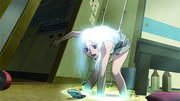Review for Tokyo ESP Collector's Edition
Introduction
We don’t see as many conventional superhero shows from the anime industry, which I used to think odd, given the confluence of comics and cartoons, manga and anime. There seems to be a disconnect between East and West when it comes to this particular genre. But of course manga as a storytelling form has significant differences from comics, not least of which is the length. Besides, Japanese culture throws up plenty of oddities and peculiarities to keep its entertainment industry brimming with ideas, without resorting to the US comics’ model of muscle-bound heroes with capes. When you think about it, characters like Son Goku, Naruto and Luffy have enough in the way of special abilities to qualify as superheroes, even if the stories that they live are markedly different. And manga and anime has been known to dabble in the superhero realm, both adapting US properties like Iron Man to the anime sphere, and Japanese originated titles, most recently with One Punch Man, while Tiger & Bunny pretty much took on the US superhero genre at its own game and managed to hold its own. Then there was Darker Than Black, a studio Bones show that I thought was the show that Heroes wanted to be. And now we get Tokyo ESP, which has X-Men written all over it, with an opening episode sequence that pays more than homage to X-Men 2’s opening of Nightcrawler bamfing through the White House. But is Tokyo ESP any good? Coming from the creator of the exceptional Ga-Rei Zero, it could very well be...
It’s Christmas, and the people are out celebrating, meeting friends, going shopping. And so are the army, along with their tanks. You’d think there was martial law in the city, and such vigilance turns out to be quite appropriate if wholly ineffective, when the Government National Diet building appears floating in the sky, ripped out of its foundations. Espers have taken the building and its inhabitants hostage, demanding wholesale change in the country. To emphasise their demands, terrorist attacks start in the city, random explosions and mayhem. It quickly becomes clear that beneath the holiday jollity there is an undercurrent of fear and hatred, against the growing threat of Espers, people with paranormal powers. But there is hope as well, as some people put their faith in the ‘White-Haired Girl’, an Esper who fights for justice and humanity. She isn’t alone in facing the terrorists; she has similarly motivated and powerful friends. But she wasn’t always this way. A year previously Rinka Urushiba was just a normal school girl, trying to make ends meet, when she encountered a shoal of flying goldfish being chased by a penguin. And then she fell out of her clothes...
12 episodes of Tokyo ESP are presented across two Blu-rays from All the Anime.
Disc 1
1. White Girl
2. Girl Meets Boy
3. Penguin and Girl
4. The Rain, Ring and Girl
5. Meeting, Phantom and Girl
6. Each Girl, Each Desire
7. Girls in the Rain
8. Fruition, Girls Set Into Motion
Disc 2
9. Attack, ESP Girls
10. In Bitter Lament...
11. Tokyo Girls War
12. Tokyo ESP Girl
Picture
Tokyo ESP gets a 1.78:1 widescreen 1080p transfer. This is apparently a port of the Funimation release, so you shouldn’t be surprised at a decent transfer, with the image clear and sharp, strong colours, and with no significant issues other than the hint of digital banding in darker scenes. It’s a solid enough conversion to Blu-ray. As for the anime itself, it’s a bit of mixed bag, with decent enough, if somewhat generic character designs (except for those outliers that verge on the caricature such as Rinka’s father), and some decent action animation, moments where you can see the money and effort on the screen. And then there will be the fall-back to pans over static shots, moments where animation stops completely, and all of a sudden Tokyo ESP looks like a much cheaper show. Xebec don’t really impress with their work here, and I do wonder what another studio may have made of Tokyo ESP.
The images in this review were kindly supplied by All the Anime.
Sound
You have the choice between Dolby TrueHD 5.1 English and 2.0 Japanese, with subtitles and signs, locked during playback on the Blu-rays. There are no issues apparent with the audio, and the subtitles are accurately timed, and free of typos. The show does well in the action stakes, making full use of the stereo in the Japanese, and kicking things up a gear when it comes to the English surround audio. Thankfully, the dub gets a decent localisation, and a natural sounding translation. It would be a good dub, but a couple of the performances didn’t quite appeal to me, particularly Minami. So as always, my preference was for the Japanese audio which was more consistent. One striking aspect to Tokyo ESP is the soundtrack, which goes an unexpected but really effective direction for its music, offering tunes that really drive the action and emotion of the piece, but sound unlike anything you might have heard in other anime.
Extras
The Blu-ray discs present their content with animated menus and look to be the Funimation discs reworked for Region B. Episode 1 is followed by translated English credit pages, but the other episodes have had their credit sequences re-versioned as Funimation is apt to do.
Disc 1 autoplays with a trailer for Serial Experiments Lain. The extras you’ll find on this disc amount to the commentaries. The commentary on episode 2 features ADR director Tyler Walker, joined by Adam Dahlberg (Kyotaro), and Sarah Wiedenheft (Rinka), while on episode 5 you get Tyler Walker again, this time with Jenny Ledel (Kuroi), Mallorie Rodak (Minami), and Jefferey Schmidt (Professor). These are the usual Funimation actor commentaries, great if you are a dub actor fan. Just remember to watch them after the series instead of after those particular episodes, or else you’ll be spoiled.
Disc 2 autoplays with a trailer for Ga-Rei Zero.
On the disc you’ll find a couple of DVD/BD Spots, a short Commercial, the textless opening and two textless closings (rendered less than textless by player forced subtitles) and the US trailer for the show. You’ll also find further Funimation trailers for Tokyo Ghoul, Noein, Terror in Resonance, Ghost in the Shell Arise 3&4, Psycho Pass Season 2, A Certain Scientific Railgun S, Lord Marksman and Vanadis, and Riddle Story of Devil.
As this is a combo release, you also get the show on two DVDs, which repeat the Blu-ray content in terms of episodes and extras. The difference is in the episode distribution, 7-5, and in the fact that the subtitles aren’t locked. Once again, these are merely the Funimation discs made Region 2, presenting their content in 1.78:1 anamorphic NTSC widescreen, with Dolby Digital 5.1 Surround English, and Dolby Digital 2.0 Stereo Japanese.
I haven’t seen the final retail product to comment on the packaging, or the 20-page artbook that will be included.
Conclusion
Tokyo ESP blows its wad in the first episode, presenting a story so grand, so epic and intense that you just have to know what happens next. On top of that, Xebec also go the full hog with the animation, getting up to theatrical quality on occasions, really pushing the boat out when it comes to action sequences, character design, and fluidity of animation. If ever an opening episode leaves you desperate for more, it’s the opening episode of Tokyo ESP. And then the show wastes it all with the subsequent 11 episodes of its run, turning what might have been the explosive hit of the season into a damp squib. Tokyo ESP never in the end delivers on what its first episode promises, and that is a far greater disappointment than if that first episode didn’t exist, or if it was moved to the episode 11 spot where it makes sense chronologically.
The first episode presents a dark vision of the future, a city practically under martial law, a government crackdown on espers, people with super-powers, and the immediate backlash that occurs when a group of espers takes control of the government building, rips it from its foundations, and takes the government hostage, demanding the rule of espers over humans. Accompanying this development is a series of terrorist incidents across the city. The people are afraid, looking for a saviour, hoping for the return of the White Girl, and when she eventually does return, the balance starts to shift, hope is restored to the populace, and an all out battle to defeat the evil espers and rescue the hostages looks imminent. It’s a hell of a start, and terrifically well animated.
And then in episode 2, we step back a year to the start of the story. We meet the White Girl, so named for her hair when powered up, just after she discovers her abilities, the ability to pass through solid matter, just after she passes out of her clothes, through the floor, and into her downstairs neighbour’s apartment. It’s definitely a funny and fan-service filled introduction to the story, and a stark contrast to the opening episode, but it also slows the pace right down, and is a more honest indication of the tone and direction of the anime. What follows over the next few episodes is an introduction to the main characters, the good guys, and in some cases a reveal of how they get their powers. Of course we see the reason in the opening episode, glowing goldfish swimming through the sky, chased by a flying penguin. When a goldfish enters a compatible person, their esper powers are activated. Most people tend to use these powers for ill, but in Rinka’s case, she’d much rather be a hero for justice, inspired by her ex-cop father, who himself attains a magnetic personality. The first person with powers that Rinka encounters is classmate Azuma Kyotaro, whose teleportation abilities awakened at the same time as Rinka’s powers, and he’s the happy-go-lucky sort with a dark past. The first ‘evil’ esper they have to deal with is Black Fist, a thief with invisibility powers, but who turns to light side when she meets Rinka’s father Rindou, and is smitten by his presence. Eventually joining their team is a prognosticator named Ayumu (whose mother is a politician drafting anti-ESP laws), and a yakuza daughter named Murasaki who has psychometry in her skills set.
Along the way we meet the villains of the piece, the scarred Professor (projecting telepath), and his determined daughter Minami (sword wielding teleporter, and Nightcrawler analogue for the opening episode), and we also learn how they are linked with Kyotaro’s past, setting up the antagonistic dynamic between Rinka and Minami. But really, the characterisations in the show are rather weak, bordering on caricature and cliché, and I certainly couldn’t buy into the relationships, and certainly not that between Rinka and Kyotaro which really should have been carrying the show.
The series progresses in this way, revealing new characters, and mixing up comedy, drama, action, and exposition in a rather stultifying way. Certainly the exposition can be clumsy, stodgy, and sit there like a lead weight dropped into the middle of the narrative, killing the pace of the show dead. The show’s tone is uneven and too lightly weighted compared to the ominous action of the opener. The show can also go in some daft directions, especially when Rindou’s mentor, the stuffed panda come to life with Astral Viewing powers is introduced. The show also goes the extra mile to deliver an explanation for the sudden proliferation of espers, and the holographic goldfish that create them, a piece of exposition that’s jaw-dropping in its audacity, but not in a good way. By the time we catch up to the opening episode to resolve the airborne hostage crisis, the show has long since lost any goodwill that opener set up, and it instead feels like a show going through the motions to get to its climax, and when that climax does come, it’s one of those ‘let’s pull something out of thin air that makes no sense, but hopefully we’ll get a season 2 out of it’ endings.
Tokyo ESP offers great promise with its opening episode, but it squanders it completely. It has moments in the series run where it comes to life, great action sequences, or little moments of character and drama which grab the attention and get you briefly interested again, but it continually loses momentum after such moments. Tokyo ESP is an average show that could have been much, much more. If the opening episode had been the starting point, and the narrative moved forward from that dramatic exclamation mark, it would have been a completely different and potentially much more interesting story. I cited Darker than Black as the show that Heroes wanted to be, and then compared to Tokyo ESP to the X-Men franchise. Of that franchise, only X-Men: The Last Stand might aspire to be this show, and then only for a minor improvement.

















































Your Opinions and Comments
Be the first to post a comment!